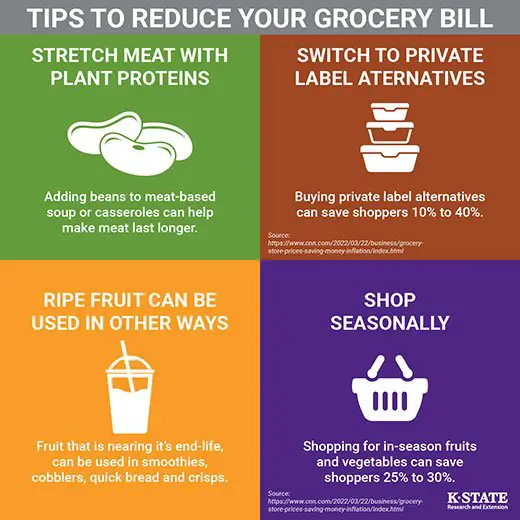Are you tired of overspending on groceries and want to find ways to save money while still enjoying delicious meals? Look no further! In this article, we will provide you with practical tips for saving money on groceries without sacrificing quality or taste. So, whether you’re a seasoned budgeter or someone looking to tighten the purse strings, these tips for saving money on groceries will help you shop smarter, eat well, and keep your wallet happy. Let’s dive in!
Tips for Saving Money on Groceries
Create a Budget and Stick to It
The first step in saving money on groceries is to create a budget and stick to it. Determine how much you can afford to spend on groceries each month and divide that amount by the number of weeks in the month. This will give you a weekly grocery budget that you can work with. Be mindful of your budget each time you go grocery shopping and resist the urge to make impulse purchases that will push you over your budget limit.
Plan Your Meals
Meal planning is an excellent way to save money on groceries. Take some time each week to plan out your meals, including breakfast, lunch, dinner, and snacks. Look for recipes that use similar ingredients to minimize waste and maximize savings. Make a list of the ingredients you’ll need for each meal and stick to it when you go grocery shopping. By planning your meals in advance, you’ll be less likely to buy unnecessary items and reduce the likelihood of food going to waste.
Shop in Bulk
Buying in bulk can save you a significant amount of money in the long run. Look for items that you use frequently, such as rice, pasta, canned goods, and toiletries, and buy them in larger quantities. Warehouse clubs like Costco or Sam’s Club are great options for bulk shopping. However, be mindful of the expiration dates and storage requirements for bulk items to avoid waste.
Compare Prices
Before you head to the grocery store, take the time to compare prices at different supermarkets in your area. Different stores may have different sales and promotions, so it’s worth checking out multiple options. You can also use online shopping platforms to compare prices and find the best deals. Additionally, keep an eye out for coupons and discounts that can further reduce the cost of your groceries.
Shop Seasonally
Purchasing fruits and vegetables that are in season can help you save money. When produce is in season, it tends to be more abundant and, therefore, less expensive. Visit your local farmers’ markets, as they often offer fresh produce at reasonable prices. By including seasonal fruits and vegetables in your meal planning, you’ll not only save money but also enjoy the best flavors and nutritional benefits.
Grow Your Own
If you have space and time, consider growing your own herbs, fruits, and vegetables. Not only is gardening a rewarding hobby, but it can also lead to significant savings on your grocery bill. You can start small with a few pots on your balcony or dedicate a part of your yard to a vegetable garden. Growing your own produce not only saves money, but it also provides you with fresh, organic options.
Avoid Shopping on an Empty Stomach
Shopping on an empty stomach can be a recipe for overspending. When you’re hungry, everything looks tempting, and you’re more likely to make impulsive purchases. Eat a meal or a snack before heading to the grocery store to curb your hunger and make smarter shopping choices. Additionally, make a list and stick to it, as this will help avoid unnecessary purchases.
Buy Store Brands
Store brands, also known as generic brands, are typically less expensive than name brands. Most store brands offer similar quality to their more expensive counterparts, so don’t be afraid to give them a try. Compare the ingredients and nutritional information between the store brand and the name brand to ensure you’re making a smart choice. You may find that there is little to no difference in taste or quality while saving a significant amount of money.
Avoid Pre-Packaged or Processed Foods
Pre-packaged and processed foods are convenient but often come with a higher price tag. These items are usually more expensive than their fresh or bulk counterparts. Instead of buying pre-packaged meals, opt for fresh ingredients and cook from scratch. Not only will this save you money, but it will also give you more control over the ingredients and nutritional value of your meals.
Use a Price Comparison App
Make use of price comparison apps to find the best deals on groceries. These apps allow you to scan barcodes or search for specific products and compare prices across different stores. They also provide information on current sales, discounts, and coupons. By utilizing these apps, you can ensure that you’re getting the best price available before making a purchase.
Minimize Food Waste
Reducing food waste is not only beneficial for the environment but also for your wallet. To avoid throwing away expired or spoiled food, plan your meals and portion sizes carefully. Freeze leftovers for future meals or repurpose them into new dishes. Additionally, keep track of what you have in your pantry and refrigerator to avoid buying duplicates.
Make a List and Stick to It
One of the most effective ways to save money on groceries is to make a list before you go shopping and stick to it. A well-thought-out list helps you stay focused and avoids impulse purchases. As you plan your meals and check your pantry, create a thorough shopping list that includes all the necessary ingredients. Organize your list by sections such as produce, dairy, meat, and pantry items to make your shopping trip more efficient.
Avoid Bulk Buying Perishable Items
While buying in bulk can save you money, it’s important to consider the perishability of certain items. Fresh produce and dairy products have a limited shelf life, so purchasing excessive quantities may lead to waste. Focus on buying non-perishable items in bulk, such as canned goods, pasta, and dry goods. For perishable items, buy only what you can reasonably consume before they spoil.
By implementing these tips for saving money on groceries, you can make significant strides in reducing your monthly expenses. Remember to remain organized, plan your meals, compare prices, and avoid unnecessary purchases. With a little effort and smart shopping, you can enjoy delicious meals while keeping your budget intact. Happy grocery shopping and saving!
WAYS TO SAVE ON GROCERIES THAT NO ONE TALKS ABOUT ????
Frequently Asked Questions
Frequently Asked Questions (FAQs)
1. How can I save money on groceries?
There are several tips you can follow to save money on groceries:
– Make a shopping list and stick to it.
– Use coupons, discount codes, or loyalty cards.
– Compare prices and shop at different stores.
– Buy in bulk.
– Plan your meals and avoid unnecessary impulse purchases.
2. Is it cheaper to buy generic or brand-name groceries?
In most cases, generic or store-brand groceries are cheaper than their brand-name counterparts. However, the quality and taste may vary, so it’s worth trying different options to see which ones you prefer.
3. What are some ways to reduce food waste and save money?
To reduce food waste and save money, you can:
– Plan your meals and only buy what you need.
– Properly store leftovers and utilize them for future meals.
– Freeze perishable items before they spoil.
– Repurpose ingredients and use them creatively in different recipes.
– Compost food scraps to reduce waste.
4. How can I make the most of sales and discounts?
To make the most of sales and discounts:
– Keep an eye on weekly flyers and online deal websites.
– Take advantage of buy-one-get-one-free offers.
– Combine coupons with sale items for additional savings.
– Join loyalty programs to receive exclusive discounts and rewards.
5. Are there any mobile apps that can help me save money on groceries?
Yes, there are several mobile apps that can help you save money on groceries. Some popular ones include:
– Ibotta
– Flipp
– Checkout 51
– Coupons.com
– Shopkick
6. How can I save money on fresh produce?
To save money on fresh produce:
– Buy seasonal fruits and vegetables.
– Look for discounted produce with slight imperfections.
– Consider local farmer’s markets for better prices.
– Grow your own fruits and vegetables if possible.
7. Can meal planning really help me save money on groceries?
Yes, meal planning can significantly help you save money on groceries. By planning your meals in advance, you can avoid impulse purchases, utilize ingredients efficiently, and reduce food waste.
8. What are some cost-effective alternatives to expensive pantry staples?
If you’re looking for cost-effective alternatives to expensive pantry staples:
– Consider buying generic or store-brand versions.
– Look for sales or bulk deals on these items.
– Explore ethnic or international grocery stores for more affordable options.
– Make your own homemade alternatives, like sauces or condiments.
Final Thoughts
In conclusion, adopting smart strategies can lead to significant savings on your grocery bills. By planning meals ahead of time, creating a shopping list based on weekly circulars, and seeking out discounts and promotions, you can effectively cut costs. Additionally, incorporating more plant-based meals and focusing on purchasing staple items in bulk can stretch your budget further. Don’t forget to compare prices and explore different grocery stores to find the best deals. With these tips for saving money on groceries, you can save money without compromising on the quality of your meals.



